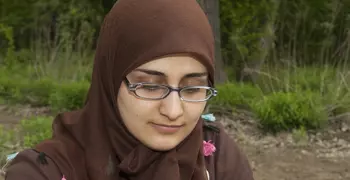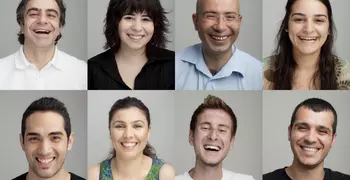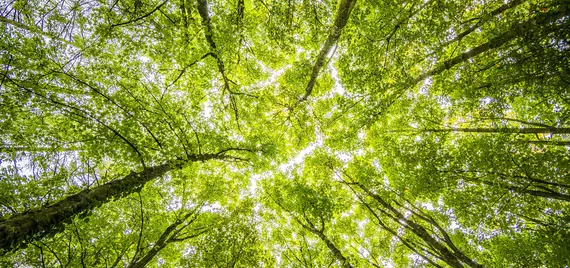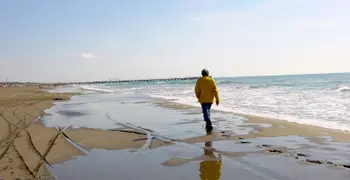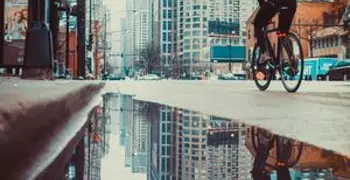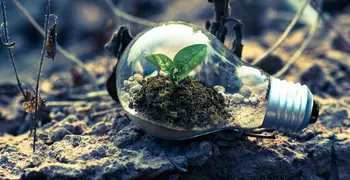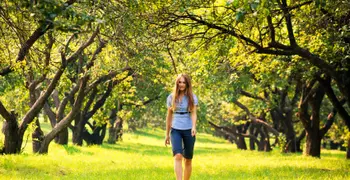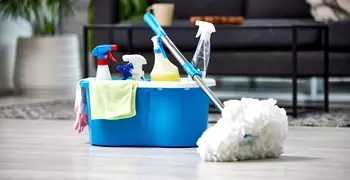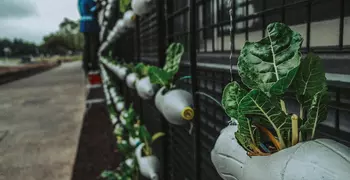Confronting the Climate Crisis: From ME to WE
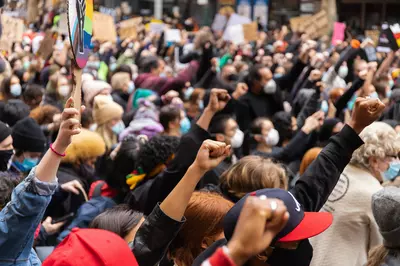

When it comes to planetary health, many of us ask ourselves the same question: "What can I do to make a difference?" We might make changes at home, shifting our habits around water consumption, limiting our electricity usage, or changing the vehicle we park in our garage. We may even hop on a bicycle more often or switch to a plant-forward diet.
While that is a good place to start, it's not the right place to stop. According to Katharine Wilkinson, PhD, "The best thing we can do for our planet is to think less about what I can do and think instead about what we can do."
In an interview with Taking Charge, the author and editor-in-chief of Project Drawdown proposed moving away from simply making lifestyle changes and instead grappling with the bigger systemic issues that drive the climate crisis in the first place.
"It's helpful to think about the climate crisis as a leadership crisis," Dr. Wilkinson said. "The folks who are holding the reins of power have not been getting the job done right. They have the capacity to be in service of present and future generations, but by and large they've just totally abdicated that responsibility."
Thus, it is often up to ordinary citizens to take ownership of the climate crisis to try to drive change. But we can't do it as individuals - we have to create a movement of collective action.
"The best thing we can do for our planet is to think less about what I can do and think instead about what we can do."
This might be a difficult concept for those of us who are drawn to tidy lists that allow us to check a box on each accomplishment. It would be satisfying if all we needed to do for our planet was change our lightbulbs or throw our plastics in the recycling bin! But tackling a problem as vast and systemic as climate change isn't that straightforward or simple. Dr. Wilkinson discussed ways you can move from the me to we in your planetary health activism.
Keep talking about planetary health within your networks
Work on healthy communicationWe can't participate in collective action without conversation. If you're afraid of ruffling feathers, don't be - just look for common ground. Dr. Wilkinson says, "People across the political spectrum support investing more in renewable energy, but for different reasons - from concern about climate change to the economy." Knowing how to approach these conversations from what she calls “the lens of solutions” can help you make more meaningful connections.
“There are layers of co-benefits, from improving air quality and public health to creating jobs to creating more energy independence,” she says. “All of a sudden you have much more fertile ground to welcome people into a conversation that can otherwise be hard.”
Learn about the systems that support inequality - so you can work with others to challenge them
"Climate change is the greatest injustice on the planet," says Dr. Wilkinson. Existing vulnerabilities become multiplied when the planet is impacted: food insecurity increases in poor areas, girls and women are more likely to be injured or killed in natural disasters, and communities of color bear the brunt of oil spills and pollution because of the proximity of refineries and pipelines to the areas where they live.
 "If you click back enough layers you realize that [the climate crisis] has its roots in extractive capitalism and colonialism, which had racism baked in from the get-go. It had misogyny baked in from the get-go," says Dr. Wilkinson. "Climate change isn't the problem - it's the manifestation of the problem."
"If you click back enough layers you realize that [the climate crisis] has its roots in extractive capitalism and colonialism, which had racism baked in from the get-go. It had misogyny baked in from the get-go," says Dr. Wilkinson. "Climate change isn't the problem - it's the manifestation of the problem."
Becoming aware of the link between inequity and climate change is the first step. Taking action might include getting involved in a group that advocates for planetary health or equality and supporting the group's efforts by sending letters to elected officials. Joining organized protests is also a good way to connect with others who are doing this work, learn more about what you can do to help, and join the chorus of voices that can together make change.
Remember, habits and behaviors spread through social networks - your actions not only work toward a solution, they can influence others to act as well.
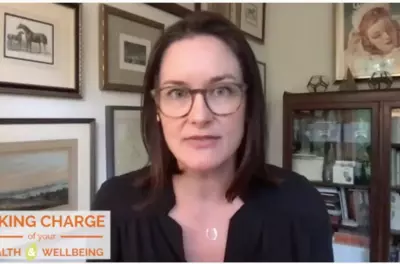
VIDEO: Dr. Wilkinson on the link between climate change and social inequity
Stay connected to your values
Dr. Wilkinson encourages you to keep making planet-friendly changes in your own life. Individual acts do have power, just not in the way you might think.
Identify your valuesShe gives an example: "I love composting and eating plant-based food. Those things are fantastic, and for me what they do is keep me grounded in my values. They make me feel like I’ve got my hands in the future that we want to create."
These small acts renew her commitment every day to the bigger picture and the need for collective action. Because, as she says, "I know that at the end of the day, it's going to take getting rid of subsidies for industrial animal agriculture for there to really be a transition in what we eat. It’s going to take political power to actually be a clean energy leader."
Bring your superpowers
 "We need literally every skill set available for this work,” says Dr. Wilkinson. Everyone has a role to play: Storytellers and artists can make cultural change. Lawyers and policy wonks can influence legislation and challenge non-compliant companies in the courts. Educators can explain and connect. Constructions experts can advocate for more energy efficient structures.
"We need literally every skill set available for this work,” says Dr. Wilkinson. Everyone has a role to play: Storytellers and artists can make cultural change. Lawyers and policy wonks can influence legislation and challenge non-compliant companies in the courts. Educators can explain and connect. Constructions experts can advocate for more energy efficient structures.
"I hope we're entering a moment when people feel more welcome into the work and are able to find a sense of ownership of climate action that goes beyond what's happening within the four walls of your own home," says Dr. Wilkinson.
Connecting to your skills, values, and gifts - your own unique sense of purpose - can help you find your place within the broader movement of planetary health.
Don't count on hope
It is easy to want to give up when the going gets tough - and working toward climate justice certainly gets tough.
"I give myself permission not to be hopeful or optimistic," says Dr. Wilkinson. "If you've got your eyes wide open, there will be grief, there will be fear, there will be anger, there will be racking uncertainty. There will also be determination and - on good days - there's courage." Practicing a mindful, nonjudgmental awareness of these sometimes painful emotions can help you avoid getting entangled in them.
But where do you turn for emotional support when doing this difficult work?
"Community has honestly been a huge part of what has sustained me," says Dr. Wilkinson. "Particularly the community of women working on climate who are coming to this movement not just with their heads but with their hearts…If there's one thing that cuts through, it's a sense of ferocious love."
Learn more about Katharine Wilkinson's work
TED Talk: How empowering women and girls can help stop global warming
Essay collection: All We Can Save
The Drawdown Review (most recent science on climate change)
